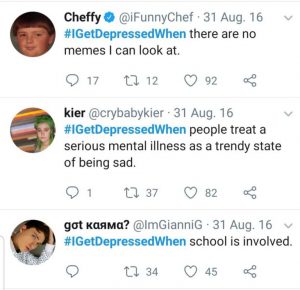In honour of “Bell Let’s Talk – Now More Than Ever”, our team wanted to share with you some best practices when talking about mental illness. Whether it’s for yourself or a loved one, it’s important to be mindful of the language you’re using. It would not only build trust with someone struggling with their mental health, it will also allow them to feel less afraid of talking about their condition.
Despite an increase in mental health awareness, those living with a mental illness still experience a significant amount of discrimination, both at work and in their personal lives. To tackle stigma, one of the most important things we can do as a society is change how we talk about mental health. The words that we choose and the tone that we use when talking about mental illness can undermine those living with it or discourage them from seeking treatment. Being more mindful of the language we use when addressing and describing mental illness will go a long way in breaking down stereotypes and promoting awareness.
Societal Shifts in Mental Health
As a society, the language around mental health is shifting from isolation and secrecy to inclusion and empathy, with a focus on being politically correct. For example, instead of saying someone had “committed suicide”, people are moving towards phrases such as “died by suicide.” This is because the word “committed” implies that the suicide was a crime, which can be alienating and upsetting to those directly affected.
The trivialization of mental illness has been a societal norm for quite some time but is now a subject of much debate. For instance, people tend to use terms such as “OCD” or “ADHD” in a largely exaggerated way to describe their otherwise relatively common behaviours and tendencies.
In 2016, Twitter saw a major (and heated) disagreement between users over the hashtag #IGetDepressedWhen.


Many Twitter users were offended that people were making light of clinical depression, while others didn’t see any harm done as they were simply using the words and terms defined in a dictionary. Nevertheless, we are seeing a movement towards a push for inclusive and politically correct language in the context of mental health.
How To Speak about Mental Illness
Here are some things to consider when speaking about mental illness to frame it in a way that respects and empowers those who live with a mental illness, as opposed to reinforcing the stigma:
1. Focus on the person and do not equate the person with their diagnosis.
To do this, use first-person language:
- Example: “Sarah is depressed”
- Change to: “Sarah has depression”
2. Stay away from insensitive terms, even if they are commonly used.
- Example “Mentally disabled”, “Mentally handicapped”
- Change to: “Has a mental illness” or “Has a mental health condition”
3. Avoid terms that suggest pity.
- Example: “Suffering from”, “Afflicted with”, or “Victim of”
- Change to: “has a history of,” “is being treated for,” or “lives with”
For more tips, check out these additional suggestions.
How to Support Someone with Mental Illness
Starling Community Members who have struggled with their own mental health share examples of the types of things you can say to support someone who is living with a mental health condition.
1. Express Support with Words
Make sure that the words you use explicitly express understanding, support, and an eagerness to listen. It’s important to let them know that their struggle does not change how you view or feel about them. Tell them that you care but avoid sharing how much it hurts you to see them struggling, as it may put pressure on them to conceal their struggles because they don’t want you to worry.
“I hear you. Is there anything I can do to help you feel better?” – Starling Community Member
2. Create Opportunities for Sharing
If you are close with someone, indicating that you have noticed some changes in their behaviour (eg. they are not as upbeat or positive) can open a door for conversation. Sharing some of the challenges that you have faced creates a safe space for them to open up to you. However, it will be important to avoid making comparisons between your struggle and theirs.
“It’s okay to be honest when speaking with me.” – Starling Community Member
3. Acknowledgement and Validation
Acknowledge that what they are going through is difficult. Normalize mental illness by telling them that many people struggle with their mental health at some point in their life and it’s nothing to feel ashamed of. Show that you understand they have an illness much like any other. However, do not be dismissive or trivialize what they are going through.
“It’s okay that you are struggling right now, we will get through it together.” – Starling Community Member
Conclusion
For those who are trying to reach out to someone who is struggling, or trying to find someone to share your own struggles with, know that you are not alone. We hope that you hold on to these words of encouragement as you continue on your mental health journey:
“Be gentle on yourself, it’s going to be okay.” – Starling Community Member
“Be patient when it comes to healing.” – Starling Community Member
“You don’t have to do it all. It’s ok to take time away for you.” – Starling Community Member“The best advice I ever read reminded me to treat myself as I would a friend. We are so much kinder to others than we are to ourselves.” – Starling Community Member
If your organization has made Starling Minds’ mental health program available to you, log in to see what your fellow Starling Community members are sharing.
If your organization currently does not offer Starling Minds, fill out this form to request a free, confidential trial and we’ll let your company know you’d like them to consider Starling for employee mental health.
Have a mental health story you’d like to share?
Let’s Talk.
Connect with us at members@starlingminds.com.
CLICK HERE FOR A FREE TIP SHEET:




